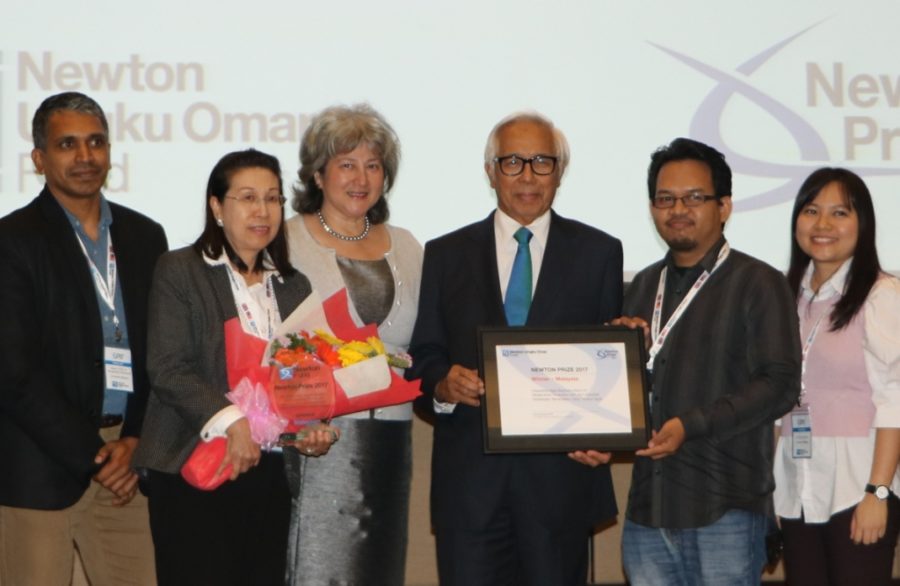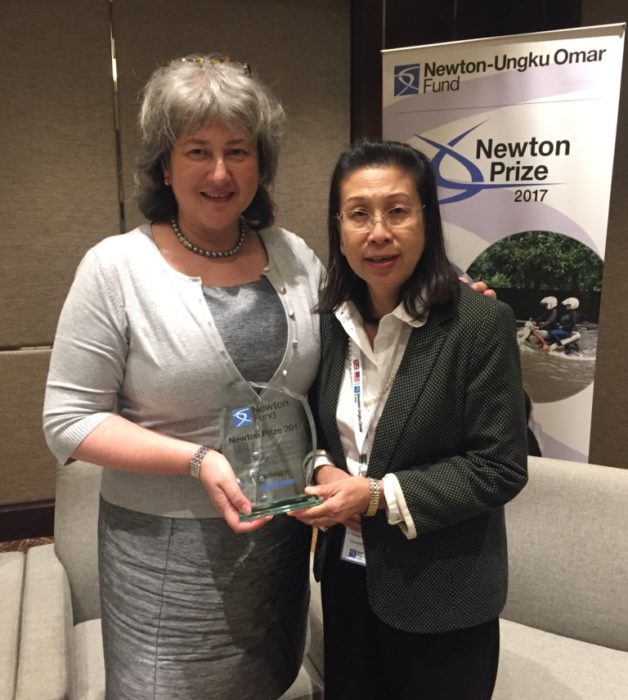8th January 2018
UK-Malaysia project generating bioelectricity from wastewater wins £197,440 Newton Prize

Winner Prof Phang Siew Moi (with flower bouquet) from University of Malaya and her team pictured here with Vicki Treadell (British High Commissioner to Malaysia) and Tan Sri Zakri Abdul Hamid (Science Advisor to the Prime Minister of Malaysia).
150 Newton-Ungku Omar Fund projects, 43 Newton Prize applications, one Newton Prize winner. After extensive review processes and lots of hard work in between, on 28 November 2017, one Newton-Ungku Omar Fund project took home the prestigious Newton Prize award worth £197,440. How did we get there?
The UK and Malaysia have always been strong partners in various fields. In the science and innovation front, the Newton-Ungku Omar Fund is often regarded as a front running example of productive and impactful collaboration between both countries. Malaysia is also one of the most active of the 18 Newton Fund countries, with one of the highest engagement rates through established collaborations at both researcher and government levels.
This year, all projects funded by Newton-Ungku Omar Fund were given a chance to add icing on the cake by applying for the inaugural Newton Prize. The winning project will receive funds worth up to £200,000 for use in advancing their existing Newton-funded research work. This is part of the Prize’s effort in recognising excellent Newton Fund research and innovation projects in support of economic development and social welfare in partnering countries, including Malaysia.
43 applications from Malaysia were received, all vying for the top prize. After rounds of peer reviews and the final committee meeting chaired by Sir Venki Ramakrishnan, President of the Royal Society, the top five projects were shortlisted. We were quite pleased to see a good mix of finalists’ projects which seeks to tackle a range of global challenges such as renewable energy, sustainable urbanisation, hazard and disaster monitoring, medical cybersecurity, as well as health and healthcare policy.
The successful relationship between UK and Malaysia in science and innovation is apparent. All the Newton Prize finalists’ projects are great examples of UK-Malaysia joint research in action, leading to practical solutions which can be used in Malaysia and even more widely around the world. All these stem from collaborative endeavour, expertise and experience of researchers from both countries.

28 November 2017 – Finally we’ve come to the awarding day. The entire pre-event buzz came to fruition when the event kick-started with an exciting showcase of the five shortlisted finalist projects, followed by presentations from each lead researcher talking about their respective project and sharing best practices. Attendees from the academic and industrial community, government agency officials and current Fund recipients showed great interest in the finalists’ work through question and answer sessions and engaging interactions with the project teams.
The awarding ceremony was also attended by British High Commissioner to Malaysia, Her Excellency Vicki Treadell and Malaysia’s Science Advisor to the Prime Minister, Professor Emeritus Tan Sri Zakri Abdul Hamid alongside representatives from Newton-Ungku Omar Fund funding partners, all of whom have been the key players in getting the Fund to where it is now.
The hall buzzed with excitement while the finalists waited with bated breath. We’ve come to the most highly anticipated moment of the day – the announcement of the coveted Newton Prize winner. One by one the runner-ups were announced and invited on stage to receive their well-deserved Newton Prize finalist and runner-up certificates. Regrettably there could only be one winner, but these runner-up projects are equally impressive. They are:
- Dr Sharifah Fatmadiana Wan Muhammad Hatta from University of Malaya, and Dr Zhigang Ji Liverpool John Moores University UK for their project on developing more secure wireless medical devices
- Professor Dr Norazmi Mohd Nor from University Sains Malaysia, and Dr Stuart Clarke, from University of Southampton UK for their project on improving infectious disease surveillance and vaccination policies
- Professor Datuk Dr Harith Ahmad from University of Malaya, and Professor Azizur Rahman from City University of London for their project on developing new sensors to predict occurrence of landslides.
- Dr Jose Siri from United Nations University – International Institute for Global Health Malaysia, and Professor Terry Marsden from Cardiff University UK for their project on developing cross-sectoral systems approaches for healthier cities
By the time the fourth runner-up was announced, the winning project team were on their feet congratulating one another. They knew they have emerged as the winner of Newton Prize Malaysia 2017. The winning project’s lead researcher, Professor Phang Siew Moi from University of Malaya accepted the award and also on behalf of her UK co-lead researcher, Dr. Adrian Fisher from University of Cambridge, for her project on producing sustainable energy from effluent waste processing.
Since its inception in 2015, this ground-breaking project successfully developed an integrated microbial fuel cell prototype using tropical algae from wastewater. This new innovation represents a blueprint that aims to meet the demands for sustainable energy and cleaner wastewater in rural areas in Malaysia.
In her winning speech, Professor Phang reached out to industry partners for possibilities in bringing this technology to palm oil mills and remote villages in Malaysia. The project’s co-funders, Malaysian Industry-Government Group for High Technology (MiGHT) and British Council, also echoed this sentiment in their interview with the media.
The Newton Fund is all about harnessing the strength and power of partnerships in developing science and innovation for the betterment of partner countries. Professor Phang wrapped up this historic day in a simple yet precise manner, “Our success is a result of a joint research with an excellent team from the UK. I am grateful to the Newton-Ungku Omar Fund which is an excellent partnership programme that has brought two groups of like-minded scientists from the UK and Malaysia to work on an idea and to bring it to fruition.”
This is what the Newton Fund Malaysia team does, and we look forward to delivering more impactful programmes in the future.
The event video can be found on UK in Malaysia Facebook page: https://www.facebook.com/bhckl/posts/1509272625815012
